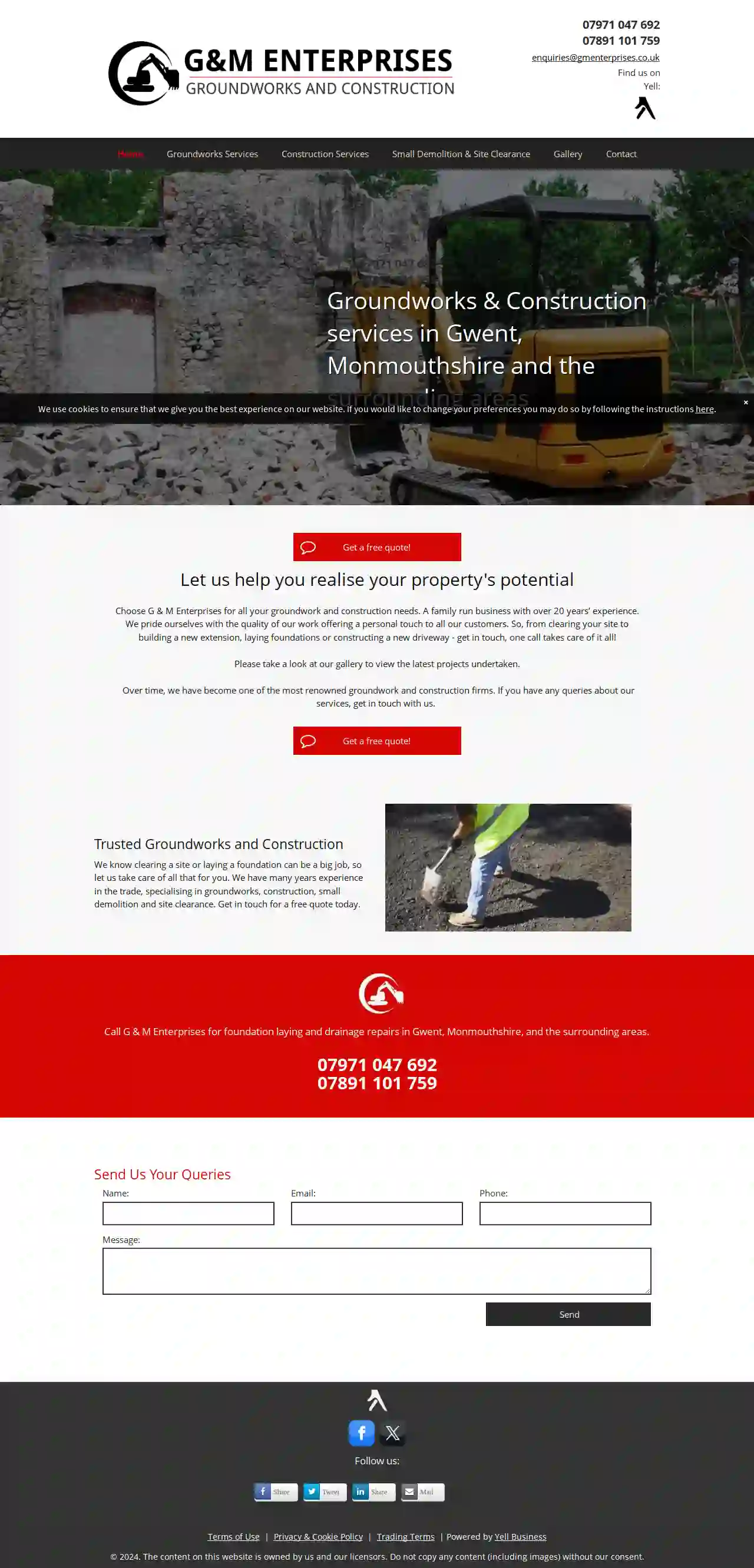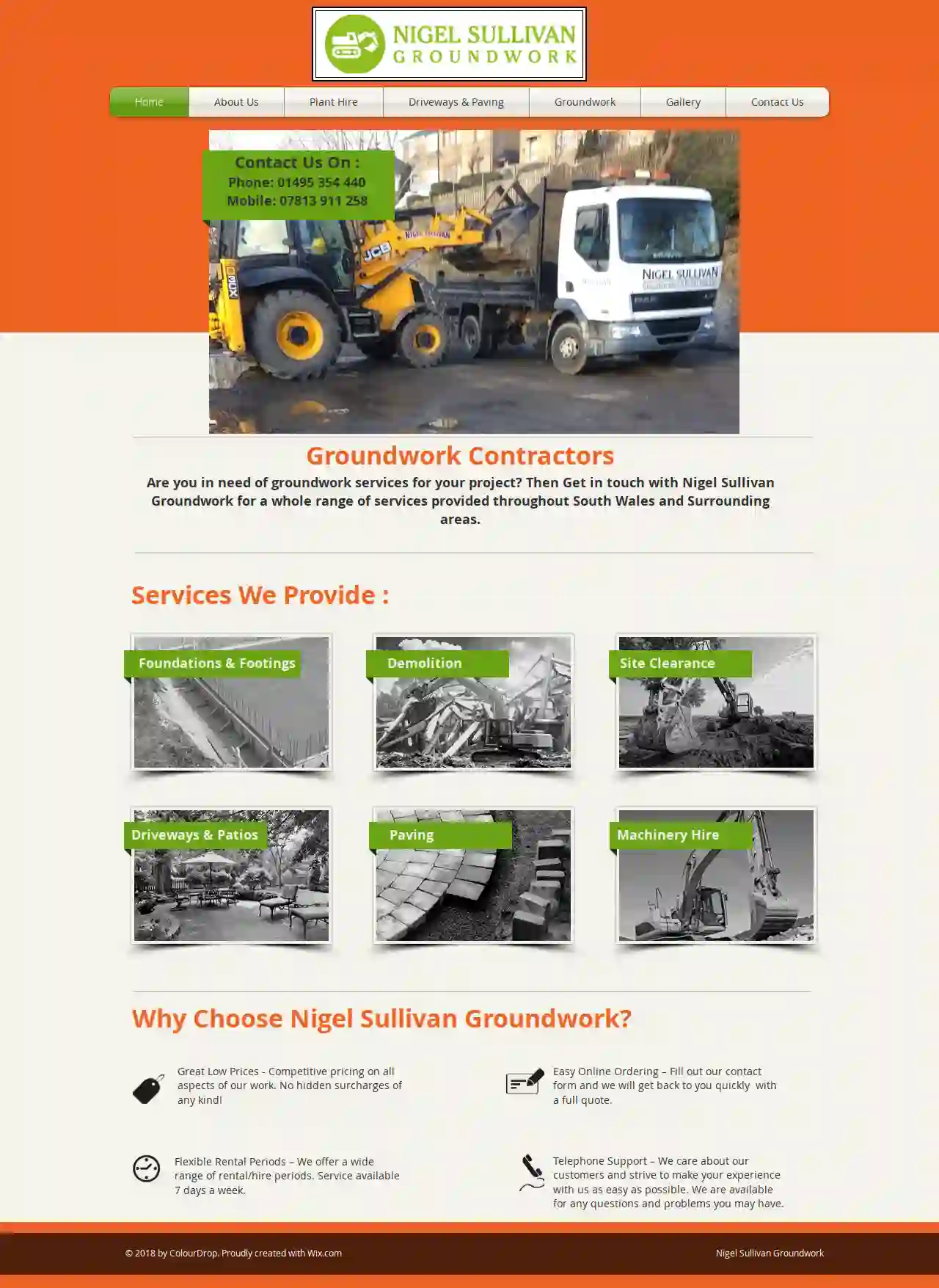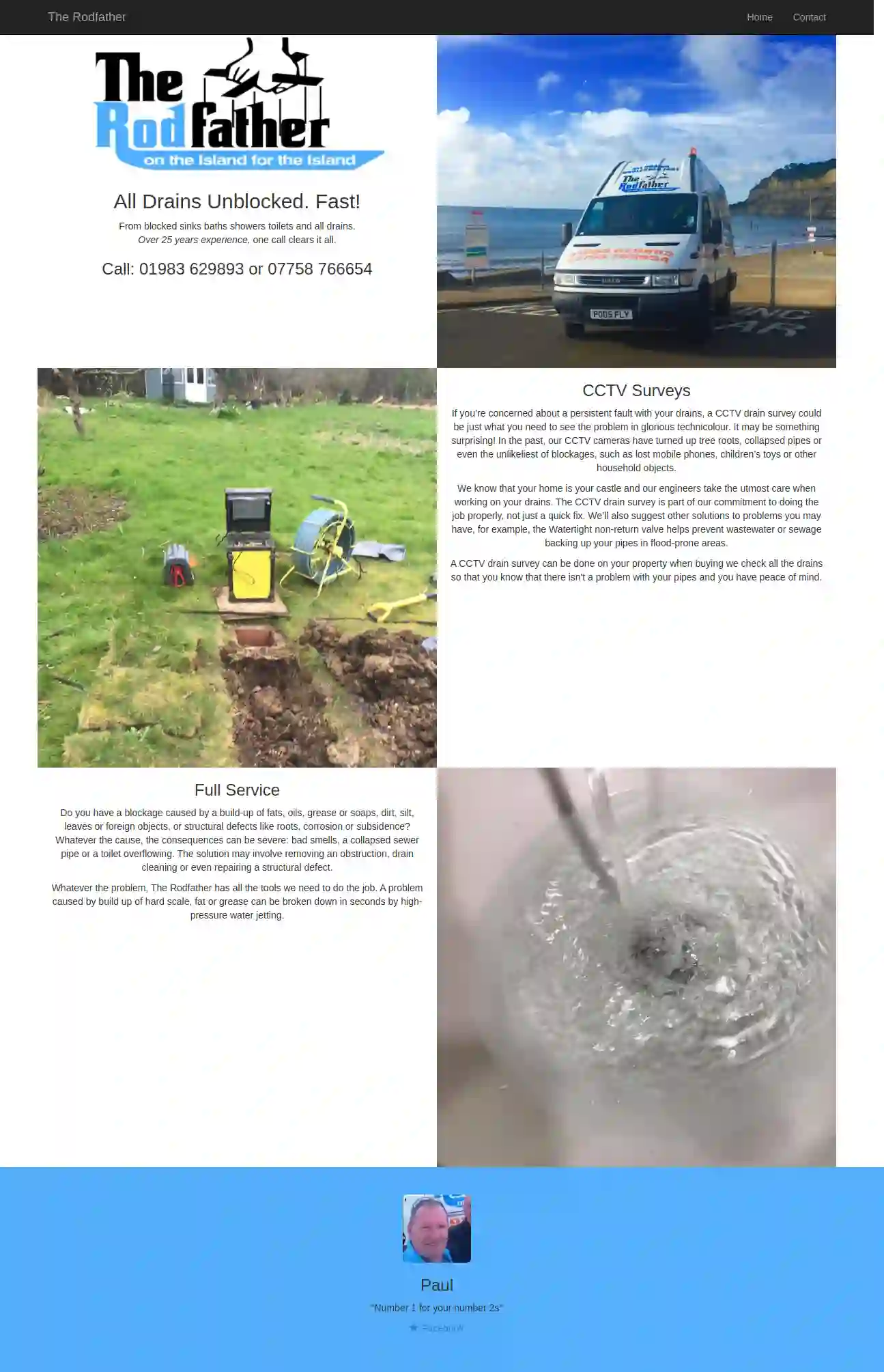Excavation Contractors Haven Street
Find the best Excavating Contractor in Haven Street
Get 3 FREE Excavation Companies quotes for your project today! Compare profiles, reviews, accreditations, portfolio, etc... and choose the best offer.

Blaenau Gwent County Borough Council
1.658 reviewsNewport, GBBlaenau Gwent Council: Serving Our Community Blaenau Gwent Council is dedicated to providing essential services and improving the lives of residents in the Blaenau Gwent area. We are committed to creating a thriving community where everyone can flourish. Our team works tirelessly to deliver a wide range of services, including: Waste & Recycling Council Tax Benefits and Council Tax Reduction Schools and Learning Health, Wellbeing, and Social Care Housing Environmental Health Planning Highways And much more! We are committed to transparency and accountability, and we encourage residents to engage with us through our website, social media, and community events.
- Services
- Why Us?
- Gallery
Get Quote
Harrison Contractors Ltd
17 St. Johns Hill, Ryde, Isle Of Wight, England, PO33 1EU, GBAsbestos Removal & Disposal Registered with the Isle of Wight Building Safety Association, our team of licensed and qualified operatives at Harrison Contractors Ltd are available to safely remove asbestos from industrial and residential buildings in Ryde and across the Isle Of Wight. Asbestos was previously used as a building material and can be found in both industrial and residential properties that were built or refurbished before the year 2000. Asbestos becomes harmful to us when the material containing the asbestos is damaged, resulting in a fine dust being apparent in the air we breathe in, ultimately making its way into our lungs. It’s vital that all asbestos removal should be carried out by trained and qualified operatives, and for high risk disposal, a licensed contractor is required to undertake the work, and that’s where we come in. At Harrison Contractors Ltd we can carry out asbestos surveys, establishing the level of risk, and can safely remove any asbestos from your building. Based in Ryde, we operate across the Isle Of Wight, also providing demolition, dismantling, reclamation and scaffolding services. To request a quote, or discuss your concerns about asbestos in your property, get in touch with us today. Why choose Harrison Contractors Ltd? Residential, commercial and industrial buildings serviced Fully trained, qualified and licensed company Registered with appropriate regulatory bodies Safe removal and disposal service Sampling and air monitoring Free quotes on all jobs Asbestos removal & disposal Concerned that your property contains harmful asbestos? Our team of licensed asbestos disposal operatives can help. Speak to the team at Harrison Contractors Ltd in Ryde today.
- Services
- Why Us?
- Accreditations
- Gallery
Get Quote
Valleys Waste Services (Grab Hire Muck Away & Demolition)
536 reviewsBarlyfields industrial estate, Valleys waste services Barlyfields industrial estate Brynmawr, Brynmawr, NP23 4YF, GBAbout Us Valleys Waste Services is a successful family run business based in Brynmawr in the heart of the South Wales Valleys. We are leading experts within Waste Management, Demolition, Hazardous Waste, Bulk excavations and Environmental services. We provide our services Nationwide.
- Services
- Why Us?
- Gallery
Get Quote
Randall's RGW plant
3.33 reviewsCwmdraw Industrial Estate, Newtown, Ebbw Vale, NP23 5AE, GBWales Plant Hire Network: Your Trusted Partner for Construction Projects At Wales Plant Hire Network, we are a collective of experienced plant hire specialists dedicated to providing exceptional service and high-quality equipment to clients across Wales and the surrounding counties. We understand the critical role that plant and machinery hire plays in the construction industry, and we are committed to ensuring that our clients have access to the right equipment at the right time to complete their projects efficiently and effectively. We offer a wide range of plant hire services, including excavators, dumpers, loading shovels, dozers, crushers, tractors, trailers, rollers, electric equipment, attachments, grab hire, tipper hire, muck away, ready mix concrete, ready mix screed, and concrete pump hire. Our fleet is meticulously maintained and serviced regularly to ensure reliability and performance. Whether you are a homeowner, a major contractor, or a national developer, we have the expertise and resources to support your project. Our team has over 200 years of combined experience in the plant hire industry, and we are committed to providing our clients with the highest level of service. We are proud to implement the best health and safety practices that comply fully with all current regulations. When you get in touch, our members will talk through your requirements and provide you with expert advice and a speedy quote. We are confident that you will find our services to be both reliable and cost-effective. Contact us today to discuss your plant hire needs.
- Services
- Why Us?
- Gallery
Get Quote
G & M Enterprises
New House, Bryn Coch, Ebbw Vale, Gwent, Monmouthshire, NP23 5DT, GBLet us help you realise your property's potential Choose G & M Enterprises for all your groundwork and construction needs. A family run business with over 20 years’ experience. We pride ourselves with the quality of our work offering a personal touch to all our customers. So, from clearing your site to building a new extension, laying foundations or constructing a new driveway - get in touch, one call takes care of it all! Trusted Groundworks and Construction We know clearing a site or laying a foundation can be a big job, so let us take care of all that for you. We have many years experience in the trade, specialising in groundworks, construction, small demolition and site clearance. Get in touch for a free quote today.
- Services
- Why Us?
- Gallery
Get Quote
JCP Construction & Maintenance Ltd
12 reviews51 North Avenue, Tredegar, NP22 3HF, GBJCP Construction & Maintenance Ltd JCP Construction & Maintenance Ltd is a well-established construction company with over 40 years of experience in the industry. We pride ourselves on our commitment to provide a professional and reliable building and construction service at all times, while maintaining the highest quality of work. You can rely on us for groundwork services, new build housing and domestic and commercial constructions. Based in Tredegar, we offer our services to clients across South Wales. JCP Construction & Maintenance Ltd’s stellar reputation stems from four decades of experience in the building industry as well as a passion for quality workmanship and customer service. Based in Tredegar, we are known for taking up large, complex building projects, embracing the latest technologies and fostering innovative ideas. We work together as a team to make a difference for our clients, employees and the community we are part of. Whenever we handle a project, we remain true to our values of honesty, quality and hard work and are proactive in finding functional solutions for all building problems our clients bring to us. We believe that lasting relationships are the driving force of our business, so we pay personal attention to our clients by focusing on them as individuals and ensuring all their building requirements are met. Every project we undertake is handled by our experienced, dedicated and friendly team of construction workers. At JCP Construction & Maintenance Ltd, we ensure that all our employees undergo regular training programmes, which helps our team to get familiarised with the latest tools and techniques used in the building and construction industry. This also helps strengthen the skills of the workforce to help deliver excellent quality services to our clients. We strongly believe that safety of our employees, sub-contractors and clients is paramount and in no way should be compromised. While carrying out work, all our employees follow strict health and safety regulations to ensure that all areas of our work environment are as safe as possible. We work hard as a team to find quality, cost–effective solutions for our clients.
- Services
- Why Us?
- Gallery
Get Quote
MCM Construction Ltd
54 reviewsRyde, GBAward Winning In 2013 MCM Construction Ltd were crowned Winners at the LABC 2013 Regional Awards and were highly commended at the National Awards for 'Best Individual Dwelling'. Free Estimates MCM provide a free no obligation estimating service tailored specifically to your needs. Contact us today to discuss your project requirements and our professional team will be happy to advise on the best course of action. Quality Assured We pay attention to detail and our workmanship is second to none. A strict recruitment and training policy ensures our highly skilled workforce is maintained and coherent with the latest legislation. 30 Years Experience We have worked tirelessly to establish a reputation for quality and reliability throughout the Isle of Wight and pride ourselves on our unrivalled wealth of knowledge and expertise within the construction industry.
- Services
- Why Us?
- Our Team
- Testimonials
- Gallery
Get Quote
Nigel Sullivan Groundworks & Plant Hire Ltd
3.84 reviewsNewport, GBAre you in need of groundwork services for your project? Then Get in touch with Nigel Sullivan Groundwork for a whole range of services provided throughout South Wales and Surrounding areas. Why Choose Nigel Sullivan Groundwork? Easy Online Ordering – Fill out our contact form and we will get back to you quickly with a full quote. Great Low Prices - Competitive pricing on all aspects of our work. No hidden surcharges of any kind! Flexible Rental Periods – We offer a wide range of rental/hire periods. Service available 7 days a week. Telephone Support – We care about our customers and strive to make your experience with us as easy as possible. We are available for any questions and problems you may have.
- Services
- Why Us?
- Gallery
Get Quote
SPG Brickwork Ltd
157 Bedwellty Road, Aberbargoed, Bargoed, CF81 9DN, GBALL ABOUT US With over 20 years of experience in the brickwork industry, SPG Brickwork Ltd consistently delivers the highest standards of workmanship, and can cover any aspect of brickwork including garden walling, new builds, extensions, and anything else you need - this includes groundworks, carpentry, and other building work that need to be in place as part of the project, so you don't need to deal with more than one company at a time, and we also specialise in fencing and patios. We always work to the highest standards, with a professional and friendly attitude, so give us a call today on 07772 607496 to get your free quote.
- Services
- Why Us?
- Testimonials
- Gallery
Get Quote
The Rodfather
4.9127 reviewsRyde, GBThe Rodfather: Your Drain Experts For over 25 years, The Rodfather has been the trusted name in drain unblocking and maintenance across the Isle of Wight. We're dedicated to providing fast, efficient, and reliable solutions for all your drainage needs, from blocked sinks and showers to toilets and all types of drains. We understand that a blocked drain can be a real inconvenience, and we're committed to getting your plumbing back in working order as quickly as possible. Our experienced team is equipped with the latest tools and techniques to tackle any drainage problem, big or small. We pride ourselves on our commitment to customer satisfaction. We're always happy to answer your questions and provide expert advice. We also offer a range of services to meet your specific needs, including: • CCTV Drain Surveys • Drain Cleaning • Drain Repairs • High-Pressure Water Jetting • Watertight Non-Return Valves Whether you're dealing with a stubborn blockage, a persistent leak, or simply need a routine inspection, The Rodfather is here to help. Contact us today for a free quote and let us take care of your drainage needs.
- Services
- Why Us?
- Our Team
- Gallery
Get Quote
Over 13,059+ Excavation Contractors in our network
Our excavation contractors operate in Haven Street and surrounding areas!
ExcavationHQ has curated and vetted Top Excavation Contractors in and around Haven Street. Find a trustworthy business today.
Frequently Asked Questions About Excavation Contractors
- Project Type and Size: Ensure the contractor has experience handling projects similar to yours in scale and complexity.
- Reputation and Reviews: Check online reviews and testimonials, and request references from previous clients.
- Licensing and Insurance: Verify that the contractor is properly licensed and insured to protect you from liability.
- Equipment and Resources: Confirm that they have the necessary equipment and resources for your project's needs.
- Communication and Transparency: Choose a contractor who communicates clearly, provides detailed estimates, and keeps you informed throughout the project.
- Safety Record: Inquire about their safety protocols and track record to ensure a safe work environment.
- Price: While price is important, it shouldn't be the only deciding factor. Balance affordability with experience, reputation, and quality of service.
- Determining Soil Suitability: Assessing whether the soil can support the intended structure or load.
- Recommending Foundation Types: Advising on the appropriate foundation design based on soil characteristics.
- Addressing Drainage and Erosion Issues: Providing solutions to manage water runoff and prevent erosion.
- Evaluating Slope Stability: Assessing the risk of landslides or soil movement on slopes.
- Building on challenging soil types (expansive clay, loose sand, etc.)
- Constructing large or complex structures
- Excavating near slopes or retaining walls
- Addressing drainage or erosion concerns
- Project Size and Scope: The larger and more complex the excavation, the higher the cost.
- Soil Type: Different soil types require different equipment and techniques, impacting costs. Rocky or clay-rich soil can be more expensive to excavate than loose soil.
- Accessibility: Difficult-to-access sites might require specialized equipment or additional labor, increasing expenses.
- Disposal Costs: Hauling away excavated material (soil, rocks, etc.) to disposal sites incurs additional fees.
- Permits and Inspections: Depending on local regulations, permits and inspections might be required, adding to the overall cost.
- Determine the Area: Measure the length and width of the area you want to fill. Multiply them to get the area in square feet (or meters).
- Determine the Depth: Measure the difference between the existing grade and the desired grade (how much you need to raise the ground). This is the depth of fill required.
- Calculate Volume: Multiply the area (step 1) by the depth (step 2) to get the volume in cubic feet (or meters).
- Account for Compaction: Fill dirt compacts when it settles, so add 10% to 25% to the calculated volume to account for compaction. The exact percentage depends on the type of fill material.
How do I choose the right excavation contractor for my project?
What is a soil engineer, and do I need one?
How much does excavation cost?
How do I calculate how much dirt I need for fill?
How do I choose the right excavation contractor for my project?
- Project Type and Size: Ensure the contractor has experience handling projects similar to yours in scale and complexity.
- Reputation and Reviews: Check online reviews and testimonials, and request references from previous clients.
- Licensing and Insurance: Verify that the contractor is properly licensed and insured to protect you from liability.
- Equipment and Resources: Confirm that they have the necessary equipment and resources for your project's needs.
- Communication and Transparency: Choose a contractor who communicates clearly, provides detailed estimates, and keeps you informed throughout the project.
- Safety Record: Inquire about their safety protocols and track record to ensure a safe work environment.
- Price: While price is important, it shouldn't be the only deciding factor. Balance affordability with experience, reputation, and quality of service.
What is a soil engineer, and do I need one?
- Determining Soil Suitability: Assessing whether the soil can support the intended structure or load.
- Recommending Foundation Types: Advising on the appropriate foundation design based on soil characteristics.
- Addressing Drainage and Erosion Issues: Providing solutions to manage water runoff and prevent erosion.
- Evaluating Slope Stability: Assessing the risk of landslides or soil movement on slopes.
- Building on challenging soil types (expansive clay, loose sand, etc.)
- Constructing large or complex structures
- Excavating near slopes or retaining walls
- Addressing drainage or erosion concerns
How much does excavation cost?
- Project Size and Scope: The larger and more complex the excavation, the higher the cost.
- Soil Type: Different soil types require different equipment and techniques, impacting costs. Rocky or clay-rich soil can be more expensive to excavate than loose soil.
- Accessibility: Difficult-to-access sites might require specialized equipment or additional labor, increasing expenses.
- Disposal Costs: Hauling away excavated material (soil, rocks, etc.) to disposal sites incurs additional fees.
- Permits and Inspections: Depending on local regulations, permits and inspections might be required, adding to the overall cost.
How do I calculate how much dirt I need for fill?
- Determine the Area: Measure the length and width of the area you want to fill. Multiply them to get the area in square feet (or meters).
- Determine the Depth: Measure the difference between the existing grade and the desired grade (how much you need to raise the ground). This is the depth of fill required.
- Calculate Volume: Multiply the area (step 1) by the depth (step 2) to get the volume in cubic feet (or meters).
- Account for Compaction: Fill dirt compacts when it settles, so add 10% to 25% to the calculated volume to account for compaction. The exact percentage depends on the type of fill material.